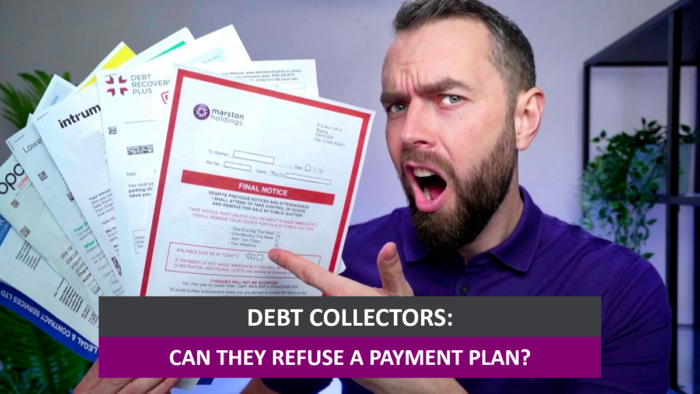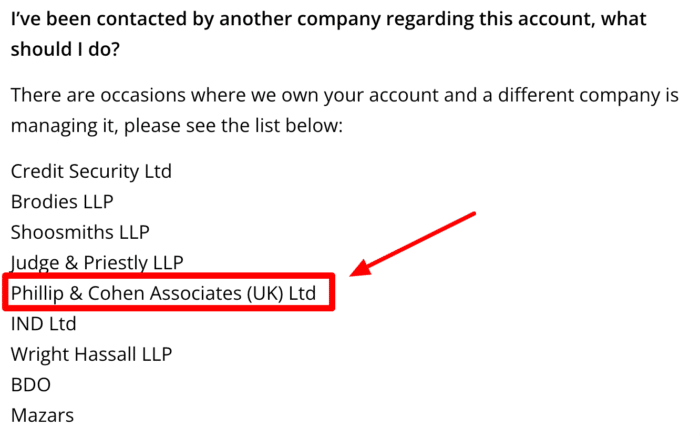Can a Debt Collector Refuse a Payment Plan? Guide & UK Laws
For free & impartial money advice you can visit MoneyHelper. We work with The Debt Advice Service who provide information about your options. This isn’t a full fact-find, some debt solutions may not be suitable in all circumstances, ongoing fees might apply & your credit rating may be affected.

For free & impartial money advice you can visit MoneyHelper. We work with The Debt Advice Service who provide information about your options. This isn’t a full fact-find, some debt solutions may not be suitable in all circumstances, ongoing fees might apply & your credit rating may be affected.
Are you worried about a letter from a debt collector? You might be asking, “Can a debt collector refuse a payment plan in the UK?”
You’re not alone. Each month, over 170,000 people come to our website for help with debt matters.
In this article, we’ll help you find answers to questions like:
- Is the debt really yours?
- Can you ask the debt collector to stop bothering you?
- What are your choices for setting up a payment plan?
- Is it possible to get some of your debt written off?
We understand how you feel – some of us have also had debt collectors chasing us. But don’t worry; we are here to help you learn more about your options and how you can deal with debt collectors in the UK.
My Creditor Has Refused My Offer, What Should I Do?
Debt repayment negotiations are tricky! From my experience, having your offers rejected can be demoralising and quite stressful.
It might be an idea to do some more research on negotiating or even speak to a debt charity for some free and specific advice.
Explain Your Circumstances
» TAKE ACTION NOW: Fill out the short debt form
Start Paying Anyway
But keep in mind that this does not mean that you have a legally binding agreement with them. This should be kept as a last resort or kept until you have a mutually agreed plan for repayments.
Tell Them About Other Creditors that have Accepted Your Offer
How a debt solution could help
Some debt solutions can:
- Stop nasty calls from creditors
- Freeze interest and charges
- Reduce your monthly payments
A few debt solutions can even result in writing off some of your debt.
Here’s an example:
Situation
| Monthly income | £2,504 |
| Monthly expenses | £2,345 |
| Total debt | £32,049 |
Monthly debt repayments
| Before | £587 |
| After | £158 |
£429 reduction in monthly payments
If you want to learn what debt solutions are available to you, click the button below to get started.
My Creditor has Refused to Freeze Interest; What Should I Do?
You can also contact a debt charity for some free debt counselling or financial advice. Their advisers will be able to walk you through all of your options and help you develop a plan of action that is most likely to succeed. This could mean that you negotiate a different type of payment plan, you appoint a third-party mediator, or you opt for a formal debt solution.
I’ve Tried Everything and My Creditors Still Refuse to Accept My Offer, What Should I Do?
How Do I Complain About My Debt Collector?
If you think that your debt collector has been unreasonable or behaved inappropriately, you can make a complaint. You can also make a complaint if you feel that they have broken any of the Financial Conduct Authority’s (FCA) guidelines.
Make your first complaint to the debt collection company in question so that they have the chance to sort out the issue themselves. Most debt collection agencies have detailed and straightforward complaint procedures for you to follow on their website.
If you feel that they have not taken your complaint seriously enough or have not addressed your issue properly, you can escalate matters.
You can make any secondary complaint to the Financial Ombudsman Service (FOS). They will investigate and, if your complaint is upheld, your debt collection company may be fined. You could even be owed compensation.
Can I Get A Debt Solution?
If your creditors have refused your negotiations or offers and you are still struggling to pay your debts, you might need a debt solution.
There are several different debt solutions available in the UK. This means that you have options, and you can choose the debt management strategy that will be best for your finances. I recommend speaking to a debt charity before you begin a debt solution, as they can give you free advice and make sure that you are making the right decision!
Debt Management Plan (DMP)
A DMP is an informal debt solution that lets you pay off your debts via a single monthly payment.
Because it is informal, it is not legally binding so you are not tied into a DMP for a minimum number of payments.
Individual Voluntary Arrangement (IVA)
An IVA is a formal agreement between you and your creditors. You agree to pay a monthly sum that is distributed amongst your debts, and your creditors agree not to contact you during your IVA.
IVAs typically last for 5 or 6 years, and any outstanding debt is wiped off when it ends.
Keep in mind that IVAs are not suitable for everyone. You need to owe several thousand pounds to more than one creditor to be eligible. You also need to demonstrate that you have some disposable income every month.
Trust Deed
IVAs are not available in Scotland. Instead, you will need to opt for a Trust Deed.
Trust Deeds work in the same way as an IVA – you pay an agreed sum each month that is shared amongst your creditors, they can’t contact you, and any leftover debt at the end of your Trust Deed term is written off.
Debt Relief Order (DRO)
A DRO is a good option for those facing financial hardship with no assets and little income.
For 12 months, you make no payments, but your creditors freeze your interest and don’t contact you.
If your finances haven’t improved during this year, you may be able to write off your unsecured debts.
Bankruptcy
If you have debts but no realistic possibility of ever paying them off, you may need to declare bankruptcy.
Bankruptcy has an unfair stigma attached to it as it may be your only way of getting a financial fresh start. That said, it is a serious financial situation that should not be taken lightly.
Sequestration
Sequestration is the Scottish version of bankruptcy.If you have little income and no valuable assets, you may be able to apply for a minimal asset process bankruptcy (MAP). A MAP is a quicker, cheaper, and more straightforward version of sequestration, so worth considering.
Thousands have already tackled their debt
Every day our partners, The Debt Advice Service, help people find out whether they can lower their repayments and finally tackle or write off some of their debt.

Natasha
I’d recommend this firm to anyone struggling with debt – my mind has been put to rest, all is getting sorted.
Reviews shown are for The Debt Advice Service.
My Creditor is Threatening Me with Court Action, What Should I Do?
Staying On Top Of Your Debts
One of the hardest parts about being in debt is that the industry isn’t at all transparent.
One common tactic used by Debt Collectors is contacting you under multiple names and addresses.
Sometimes, it’s for practical reasons, but even then it can be confusing and intimidating. So it’s important to try to keep a level head and research what’s going on.
Some of the biggest debt collectors in the UK operate under multiple names.
- Robinson Way will sometimes contact you under the name Hoist Finance.
- Cabot Financial Group recently bought Wescot Credit Services
- Credit Style communicate as both Credit Style and CST Law.
- Lowell Financial also owns Overdales and collects debts under both names.
In fact, in the case of PRA Group, they’ve been known to use multiple company names. As you can see in the image below.

If you’ve been contacted by a debt collector recently, it’s worth going through your post and emails to check that you haven’t missed anything, just in case they’ve started writing to you under a different name.


